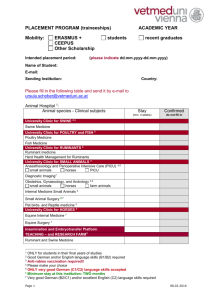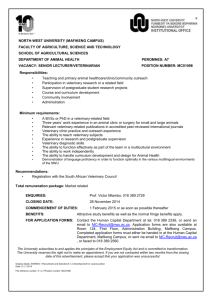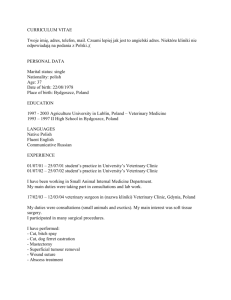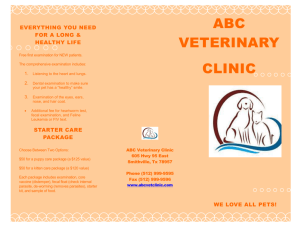tempus project student exchange report
advertisement
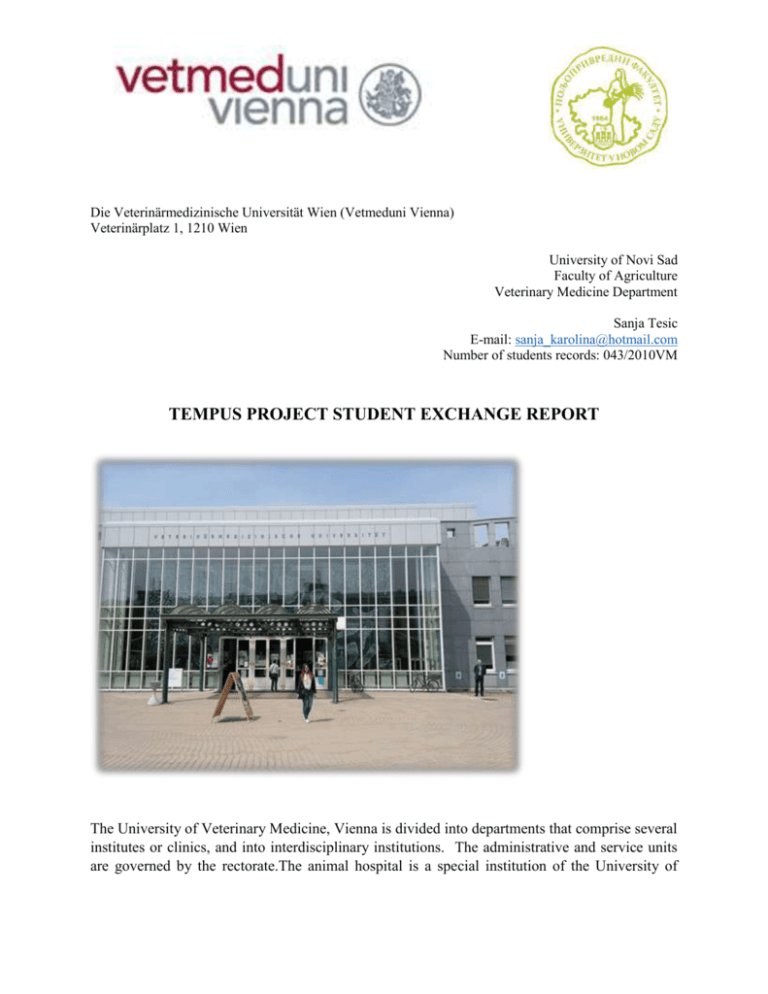
Die Veterinärmedizinische Universität Wien (Vetmeduni Vienna) Veterinärplatz 1, 1210 Wien University of Novi Sad Faculty of Agriculture Veterinary Medicine Department Sanja Tesic E-mail: sanja_karolina@hotmail.com Number of students records: 043/2010VM TEMPUS PROJECT STUDENT EXCHANGE REPORT The University of Veterinary Medicine, Vienna is divided into departments that comprise several institutes or clinics, and into interdisciplinary institutions. The administrative and service units are governed by the rectorate.The animal hospital is a special institution of the University of Veterinary Medicine, Vienna, comprising organisational units that provide veterinary services to animal patients. The history of the University of Veterinary Medicine, Vienna extends back into the mid18th century to the reign of Empress Maria Theresia (1717-1780). On March 24, 1765, the monarch decreed the establishment of "a school providing instruction in healing diseases of livestock." Thus began the history of veterinary medicine in Vienna and the school teaching it there. Human medicine and the military decisively shaped scientific developments at this school, which set an example to be emulated by other schools of veterinary medicine in the Habsburg Monarchy and elsewhere in Europe. Vienna attracted students from throughout Europe and all over the world—just as it does today. The Tierarznei-Institut, predecessor institution of the Vetmeduni Vienna, was likewise attended by many foreign students. In the 19th century, most of the student body came from the Habsburg Monarchy, the collapse of which in 1919 created a difficult situation for many students. Today, the Vetmeduni Vienna is the only specialized university in its field in Austria and the only Austrian educational institution offering instruction in veterinary medicine. It provides world-class training to future veterinarians and conducts advanced research on behalf of the health of animals and humans—in an interdisciplinary and international context. This year 2 344 students signed into Vetmeduni, out of whom 1869 females. Studies last for six years, divided into two semesters. After third year, students pick what they want to specialize for and then they attend clinical classes just for choosen animal species with just few rotations in different clinics. Students are not obligated to attend lectures that they not interested in, while the practice is necessarily for all students. When they do the exam they have three parts, first test, then practical part and if they pass then professor asks them theory. After every practical part they need to fill signature in their books. In the end they write their diploma in English and present their work in the same way as we do at our University. In period of three months during my exchange program I attended two practical trainings. From 3. February-30. March I was at University clinic for Fish and Poultry medicine and from 6.-30. April I had practical trainee at University clinic for Swine. Professional practical training at the University clinic for Fish and Poultry medicine The Clinic is responsible for scientific teaching and research in the veterinary medical fields and disciplines related to poultry and fish, including examination, treatment and hospitalization of animals, in case of fish medicine. To stay abreast of the increasing specialization in the field, the Clinic is organized into two different Clinical Units. Each of the Clinic’s Units houses has the most modern technical equipment in state-of-the art facilities. I took place at the Clinic for Fish Medicine under the supervision of Univ. Prof. Dr. Mansour ElMatbouli and Dr. med. vet. Eva Lewisch. As a part of clinical disease diagnosis I have learned to deal with clients, to do main clinical examination and to identify main parasitic, viral and bacteriological diseases. Also, I took place at sampling for viral, bacterial and parasitic exploration and to assume which kind of medicament we should use. I`ve learned main behaviour and safety rules in laboratory working, and also most important techniques such as DNA extraction, PCR, RT-PCR, Nested PCR and electroforesis. I`ve done at least one PCR and Nested PCR per day. I also took part in project of my colleagues, where we isolated spores of M.cerebralis from fish bones and cartilage. With lot of patience of Dr. Subhodeep Sarker, I`ve learned a lot about life cycle, pathogenicity and clinical sings of this very immportant patogen in Fish medicine. We had a few clinical cases where I was assisting and that was a whole new thing for me because it is not so usual in my country to have cases like this. I attended three lectures about fish diseases and importance of fish meat in human nutrition held by Prof. Dr Matbouli El-Mansour. Students were really interested in that subject and they discussed with professor about any question they had. Lectures were in German and it is aloved to take a dog, cat or any other animal specie you have as a pet, at lecture. . Practical training at university clinic for Swine This training not only takes place at the clinic but also at the teaching and research farm as well as at various farms in collaboration with colleagues practicing in the field. Research is focused on swine diseases that are currently of interest to researchers, farmers and state administration. Examples include PCV2, PRRSV, swine influenza virus and Haemophilus parasuis. It is paramount for this clinic to work closely with other departments of the University of Veterinary Medicine, Vienna. This rotation counted one group with 4 students. We had few cases at Patology department where we had to take clinical examination and also euthanisation and necropsy. I`ve done many times anestezie in ear vein and blood sampeling from the heart. We were taking the sampels and discussing about pathological changes we had found. Every organ we examined separately, trying to recognize any abnormality. In laboratory of Swine clinic we had our Swines for teaching and learning. Every day we done round trip to se any change if it happened. Bronhoalveolar lavage was also part of the trainee, what I never done in Novi Sad before. We all had chance to do bronhoalveolar lavage three of four times after really clear elucidation from professor. Two times I was at researching farm for Swine ``Hof Medau`` where we learned how to deal with new born piglets. Also, I took part at necropsy of 80 piglets at Medau for experiment sponsored by Austria. Proffesors explained us every step with a lot of understanding. Also, every time we didn`t undersand anything on German they had translated us to English. I attended two lectures about Swine diseases which was enough to make a conclusion how different relations are between professors and students there, than here, in Novi Sad Conclusion If I can evaluate my scholarship at The Clinc for Fish Medicine and Swine Medicine in Vienna I would like to point out that it gave me a great possibilities to make a huge progress in general. I have gathered information related to medicine field of studies what will be very useful to continue my studies at my home university. Moreover, I had an opportunity to meet and cooperate with people from all of the world. We exchanged our knowledge and experience what is very important to me and my studies.
